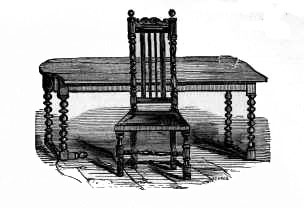Sir Charles Coote

Table and Chair used at the Confederation of Kilkenny
English Adventurers speculate on Irish Disaffection—Coote's Cruelties—Meeting of Irish Noblemen and Gentlemen—Discontent of the People—The Catholic Priests try to save Protestants from their fury—A National Synod to deliberate on the State of Irish Affairs—The General Assembly is convened at Kilkenny—A Mint is established—A Printing-Press set up—Relations are entered into with Foreign States, and a Method of Government is organized—Differences of Opinion between the Old Irish and Anglo-Irish—A Year's Treaty is made—Arrival of Rinuccini—He lands at Kenmare—His Account of the Irish People—His Reception at Kilkenny—His Opinion of the State of Affairs—Divisions of the Confederates—Ormonde's Intrigues—The Battle of Benburb—Divisions and Discord in Camp and Senate—A Treaty signed and published by the Representatives of the English King—Rinuccini returns to Italy.
[A.D. 1642—1649.]

'NEILL now took the title of "Lord-General of the Catholic army in Ulster." A proclamation was issued by the Irish Government, declaring he had received no authority from the King; and the ruling powers were often heard to say, "that the more were in rebellion, the more lands should be forfeited to them."[6] A company of adventurers were already formed in London on speculation, and a rich harvest was anticipated. Several engagements took place, in which the insurgents were on the whole successful. It was now confidently stated that a general massacre of the Catholics was intended; and, indeed, the conduct of those engaged in putting down the rising, was very suggestive of such a purpose. In Wicklow, Sir Charles Coote put many innocent persons to the sword, without distinction of age or sex. On one occasion, when he met a soldier carrying an infant on the point of his pike, he was charged with saying that "he liked such frolics."[7] Carte admits that his temper was rather "sour;" but he relates incidents in his career which should make one think "barbarous" would be the more appropriate term. The Lords Justices approved of his proceedings; and Lord Castlehaven gives a fearful account of the conduct of troops sent out by these gentlemen, who "killed men, women, and children promiscuously; which procedure," he says, "not only exasperated the rebels, and induced them to commit the like cruelties upon the English, but frightened the nobility and gentry about; who, seeing the harmless country people, without respect of age or sex, thus barbarously murdered, and themselves then openly threatened as favourers of the rebellion, for paying the contributions they could not possibly refuse, resolved to stand upon their guard."[8]
Notes
[6] Them.—Castlehaven's Memoirs, p. 28.
[7] Frolics.—Carte's Ormonde, vol. i. p. 245, folio edition.
[8] Guard.—Castlehaven's Memoirs, p. 30. Coote's cruelties are admitted on all sides to have been most fearful. Leland speaks of "his ruthless and indiscriminate carnage."—History of Ireland, vol. iii. p. 146. Warner says "he was a stranger to mercy."—History of the Irish Rebellion, p. 135. " And yet this was the man," says Lord Castlehaven, "whom the Lords Justices picked out to entrust with a commission of martial-law, which he performed with delight, and with a wanton kind of cruelty."
